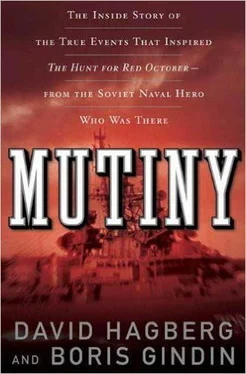Everyone knows the system and the law, but there’s probably never been a warship on which at least one of the crew has not thought about mutiny. Captains have to make dozens, if not hundreds, of decisions every single day their ship is at sea. If a captain is under stress, such as during a storm or time of war, his orders come even faster and must be instantly obeyed for the safety of the ship and his crew.
No one can agree with every order, nor can every order please everyone or even be understandable, say, to a kid fresh off the farm and out of boot camp.
Over time these kinds of misunderstandings and resentments can lead to a full-blown mutiny. Some little incident provides the spark, rage boils over, and a part of the crew takes over the ship. Like with the Potemkin sixty years earlier. People get killed. The survivors go to prison.
Another separate class of mutinies exists in which one of the men aboard ship, and it’s usually an officer, wants to make a statement, sometimes about a tyrannical captain, as in the case aboard the British sailing vessel Bounty, or sometimes, like this moment at a mooring in the Daugava River, a zampolit wants to make a statement about the rotten government he serves under.
Something dreadful has happened that Gindin, who has just dropped his black backgammon piece into the basket in the midshipmen’s dining hall, has no way of knowing. Only three men at this moment share that knowledge, Potulniy, Sablin, and Seaman Shein, the sailor in the projection closet. But everyone else is about to feel the consequences, which carry the very real likelihood that all of them will die.
Earlier that afternoon, when one-third of the crew had been given liberty to go ashore, Sablin had retired alone to his cabin to write a letter outlining exactly what he planned to do this evening. He was going to explain his purpose to the key officers and crew, who would take over the ship and first thing in the morning leave with the rest of the fleet. But instead of heading to the shipyard for his two-week refit, the Storozhevoy was going to lay off Leningrad, where Sablin would broadcast his statement to the Soviet people.
It was the same message he’d written to his wife, Nina, and had posted from Baltiysk four days ago just before they’d sailed up here. He carefully folded this letter and sealed it in a plain white envelope on which he wrote: Cptn. Potulniy.
Next, he called Seaman Shein to his cabin. Sablin had taken the young mechanic into his confidence before they’d left Baltiysk a couple days ago, promising that if the sailor could convince some of his friends to help with the mutiny Sablin would guarantee their demobilization when it was all over.
It meant that if Shein and his friends helped the zampolit they would get orders allowing them to leave the navy and return home. It was a no-brainer, except that Sablin didn’t have the authority. But the kids didn’t know that.
Shein’s only real worry is that Sablin might be planning to defect to the West with the ship. The seaman has learned to have a lot of respect for the zampolit, but he asks point-blank if Sablin is a foreign spy.
Sablin has to laugh. He claps the young man on the shoulder. “If I were a spy I would simply blow up the ship; I wouldn’t bother with a mutiny,” he says. “Nor would I bother to send a message to the people.”
Shein has listened to the tape-recorded message, which made little or no sense to him. He is just a kid from Togliatti, a small town on the remote Chinese border, who got into some trouble and was forced to join the navy or go to jail. What does he know about political statements? All he knows is that if he and the others help out, the zampolit will get them out of the navy.
“If this goes wrong, we’ll all be shot,” Shein argues. He’s frightened, and it shows. “The KGB doesn’t screw around.”
“No one’s going to get shot; trust me,” Sablin promises. “Anyway, if something like that happened it would only be the officers, not the enlisted men.”
“I don’t want to end up in a gulag, freezing my ass off, eating rats.”
“It won’t be like that, either,” Sablin says. “Are you with me?”
Shein nods a little uncertainly, still not 100 percent sure of anything, except that he would like to get out of the navy and return home.
“Good man,” Sablin says, beaming. He hands Shein the envelope addressed to the captain and instructs the seaman to go to the ship’s library and pick out a few books that Captain Potulniy might like to read.
Again Shein nods uncertainly, even less sure what’s going on. What does getting some books for the captain have to do with a mutiny?
“I want you to take the books and the letter down to sonar parts compartment two,” Sablin orders. It’s far forward and at just about the lowest point in the ship, except for the bilges, and at this hour of the evening, at a mooring, the compartment will be unmanned. “Then I want you to disconnect the phone and take it out of there.”
“Yes, sir,” Shein says. He’s really confused, but suddenly Sablin makes everything frighteningly clear.
“As soon as you have the compartment ready, let me know. It’s where we’ll keep the captain after I arrest him.”
Shein steps back a pace, the enormity of what they are about to do striking him in the gut. Arrest Captain Potulniy? The captain is not a bad man. In fact, Shein has never exchanged so much as one word with him. And it’s not the captain who’s at fault for what Sablin preaches is a failure of trust by Moscow.
Sablin pulls a Makarov 9mm pistol out of a drawer. “Take this, and when you’re finished belowdecks go directly to the midshipmen’s dining hall, and I’ll meet you.” He grins. “Right now Comrade Mauser is empty, but I’ll give you the magazine in plenty of time.”
“I don’t want to shoot anybody,” Shein complains.
“Not to worry, Alexander, you won’t have to shoot anybody,” Sablin says, getting to his feet. “I promise you. Now hurry and get the compartment ready for our guest; we don’t have much time left.”
Shein turns and leaves, but before he does Sablin can read the confusion and worry in the boy’s eyes. To this point Shein had been led to believe that Captain Potulniy was going along with the plot. There was going to be a mutiny, but in name only, because the captain himself would be a part of the conspiracy. It is a small white lie, in Sablin’s mind, but a necessary lie to ensure that everything goes well.
If Potulniy gets so much as a whiff of the plot before he is secured in the compartment below, he will sound the alarm and fight back. At that point all of Sablin’s carefully laid plans will be reduced to nothing more than an exercise in futility.
A dangerous exercise in futility, because officers who attempt mutiny and fail at it get their nine ounces. A 9mm bullet to the back of the head.
The next fifteen minutes while Sablin waits for Shein to report back that the sonar compartment is ready are difficult for Sablin, who paces his compartment. This part of the plot wouldn’t have been so critical if Potulniy had gone ashore this afternoon for a few hours of liberty. Sablin had planned on going with the captain and somehow ditching him in Riga.
How Sablin had planned accomplishing that part will probably never be known, but he was, if nothing else, a romantic, and ditching the captain ashore sounded swashbuckling.
But Potulniy refused. He had too much work to do aboard before they sailed for the shipyards tomorrow. Which was too bad, because Sablin had a real respect for the captain, and everybody knew it.
Shein appears back at Sablin’s cabin. “It’s done,” he says, a little breathlessly. His face is pale and his brow sweaty.
Читать дальше












